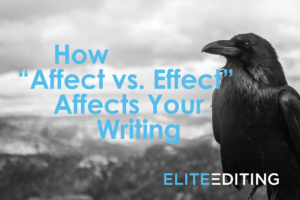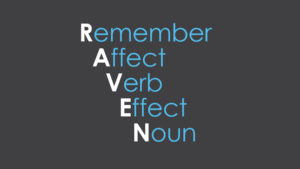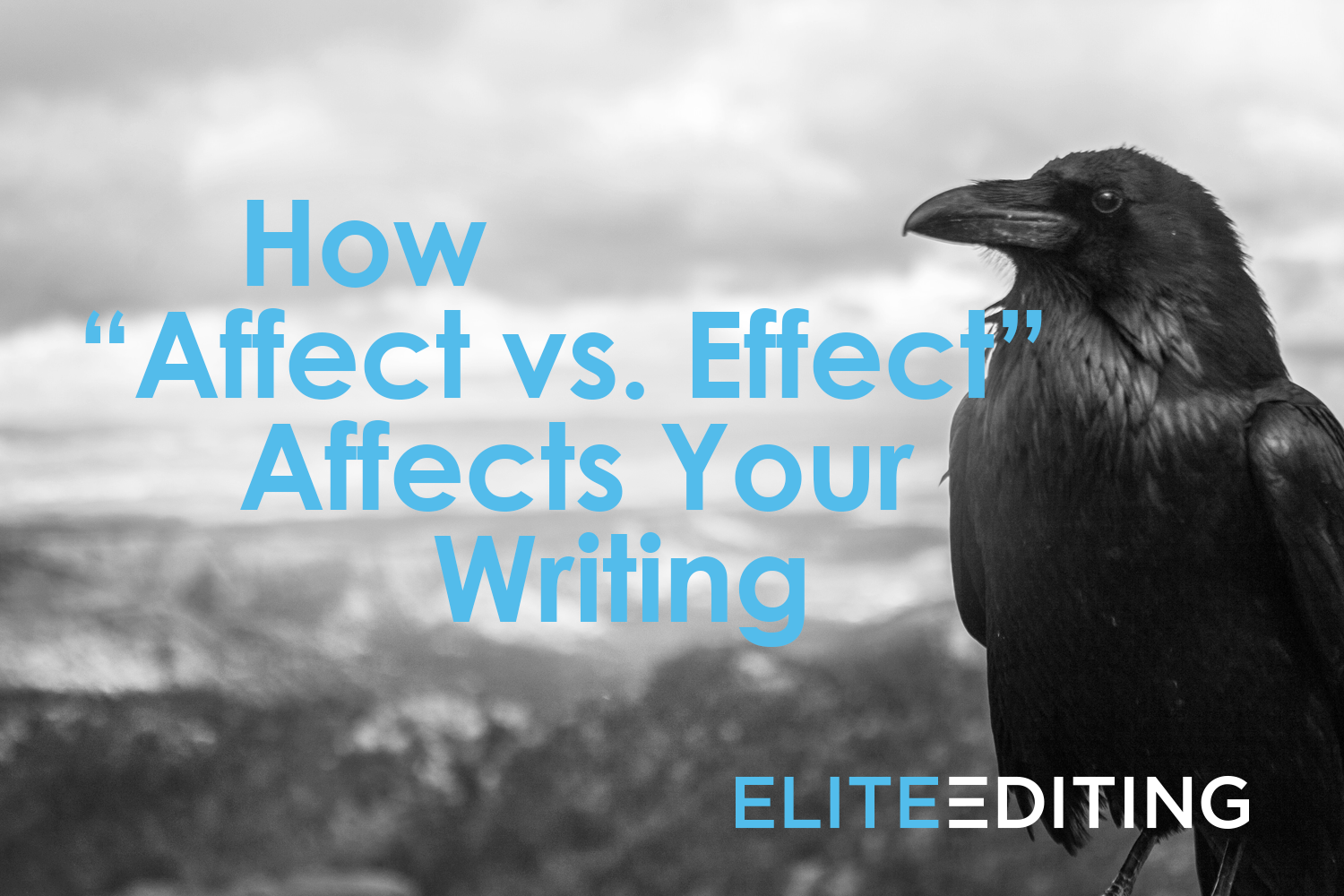
“Affect” is normally a verb meaning to change, impact, or influence. “Effect” is usually a noun meaning the result of a change. On the surface, this seems easy enough, but English is one of those languages that always finds a way to complicate matters. In some circumstances “affect” can be a noun and “effect” a verb.
What Is the Rule of Affect and Effect about, Anyway?
Using “affect” vs. “effect” is usually straightforward. In most cases you will use “affect” as a verb and “effect” as a noun. Here are some examples of how to use each (we’ll get to the exceptions in a moment).
When to Use “Affect” and “Effect”
“Affect” means to act on, to produce a change (or effect), or to move a person’s feelings. For instance, you’d use “affect” instead of “effect” in the following sentences:
- The early frost affected the harvest.
- His mother’s death affected him deeply.
- The poison is deadly to rodents but does not affect humans.
Less commonly, “affect” can mean to pretend, to feign, or to assume an attitude or character. You’re less likely to run into these uses of “affect,” but it’s helpful to know they exist:
- He affected an English accent to appear more dignified.
- He affected intelligence he didn’t have.
- She affected conservative views in public but was liberal in private.
When to Use “Effect”
Using “effect” is easy enough once you remember the word is usually a noun. “Effect” most often refers to something produced by an action, consequence, agency, or cause—or a person’s or thing’s ability to produce a result:
- Long night shifts had a negative effect on her sleep patterns.
- Shouting angrily had no effect on the football game’s outcome.
- The overall effect of the scandal was devastating.
“Effect” can also refer to a meaning, sense, or mental impression:
- The critic hated the movie and wrote to that effect.
- The lingering effect of the news story left her unsettled for days.
Finally, “effect” can refer to an impression or an artificial phenomenon:
- The magician used mirrors to create a spectacular effect.
- He talked loudly, pounding the table with his fist for effect.
What Is the Rule of “Affect” and “Effect” When “Effect” Is a Verb?
While using “affect” as a verb and “effect” as a noun is correct most of the time, there are situations where the rule of “affect” and “effect” reverses itself. In specific circumstances, you’ll use “effect” in a sentence as a verb and use “affect” as a noun.
Is It “Effect” Change or “Affect” Change?
The rule of “affect” and “effect” becomes complicated in circumstances when “effect” is used as a verb. For instance, many people wonder, is it “effect” change or “affect” change?
When used as a verb, “effect” means to bring about, accomplish, or make happen:
- The new government effected changes to many policies after the election.
In the example above, using “effected” indicates that the policy changes were created by the new government.
“Affecting” vs. “Effecting
Another example of how using “effect” instead of “affect” changes sentence meaning is in the case of “affecting” vs. “effecting.”
- Climate change is affecting [having an influence on or producing change in] polar bears.
- Climate change is effecting [making happen or accomplishing] a shift in public policies.
“Affecting” vs. “effecting,” like other examples of using “affect” and “effect” as verbs, means the difference between the sentence’s subject influencing the object (“affect”) or accomplishing something (“effect”). It’s a subtle difference and one that can trip you up if you’re not careful.
Using “Affect” as a Noun
It’s unlikely you’ll be using “affect” as a noun often unless you’re a mental health professional. In medical terms, “affect” is used to describe a person’s emotional state:
- The patient displayed a flat, emotionless affect.
- The man’s affect was one of extreme agitation.
- The young girl’s affect was impossible to read.
Is It “In Effect” or “In Affect”?
“In effect” is a propositional phrase used as an adverb or adjective. The phase means “in force,” “ongoing,” or “operational.”
The phrase “in affect,” in contrast, simply doesn’t exist. Once you understand this, you never again have to ask, is it “in effect” or “in affect.” Below are some examples of how to use “in effect” in a sentence:
- Correct: The flash flood advisory is still in effect.
- Incorrect: The flash flood advisory is still in affect.
- Correct: The recall of contaminated chocolate remains in effect.
- Incorrect: The recall of contaminated chocolate remains in affect.
How Do You Remember “Affect” and “Effect?”
Remembering when to use “affect” vs. “effect” isn’t difficult. Over time, people have come up with a couple of strategies to remember the difference. Just remember that none of these tricks account for exceptions to the rule of “affect” and “effect.”
A Is for “Affect”
Here’s an easy way to remember that “affect” is usually a verb. Both “affect” and “action” begin with an A. Verbs are action words, so “affect” is a verb.
Remember the RAVEN
The RAVEN mnemonic is an ideal way to remember the difference between “affect” and “effect.” RAVEN stands for Remember: Affect=Verb, Effect=Noun.

Conclusion
Once you understand the different ways to correctly use “affect” vs. “effect,” you’ll have no difficulty keeping the two words straight in your head (and your writing). Remember that “affect” is usually a verb and that “effect” is normally a noun, and keep an eye out for exceptions to the rule. Then the confusion surrounding these two words will no longer affect your ability to write brilliantly!
For more information on commonly confused words, check out our article on “aid” vs. “aide.”








